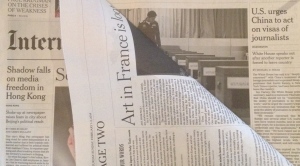

By Robert Delaney
Why is press freedom in Greater China so important for the New York Times?
Sitting in the Raffles Hotel’s storied Long Bar in Singapore this week, the bartender gave me a copy of the paper’s international edition. Stories about press freedom in China occupied prominent spots on pages A1 and A3: one about the sudden departure of the editor-in-chief of a well-respected Hong Kong newspaper known for investigating corruption and corporate malfeasance, the other about a Beijing-based New York Times journalist, Austin Ramzy, whose work visa wasn’t renewed. Ramzy had to pack up and leave China.
These are bad developments, but they concern me much less than what’s happening to the press in North America.
As a journalist, press freedom has been important to me on two levels: the implications for an industry that has been my livelihood for almost two decades, and the essential role that objective, well-researched, and professionally edited journalism plays in keeping politicians and corporations more honest than they would be in an environment free of committed journalists.
Unfortunately, the value of journalism has dropped sharply in North America, and I can’t help notice the lack of concern about this. For every Austin Ramzy forced to leave China, there are hundreds of journalists in North America who are essentially forced to take buyouts or are simply let go. The reasons for this are too complicated to analyze in one blog post, but consider this: When the Globe and Mail puts anything that suggests nudity on its home page, the clicks far exceed those on important stories that take days, weeks, or months to research and edit. That’s why videos like this one about Margot Robbie’s nudity stay on the site for weeks and reports this one by Janet McFarland and Jeff Gray cycles off within hours. The latter should be of interest to anyone who aims to retire comfortably.
Many analysts have faith in bloggers, some of whom produce engaging and relevant content. But this I’m sure of: it takes a newsroom to blow the lid off the ugliest of scandals. For example, the investigations of Toronto mayor Rob Ford and his family by the Globe and the Toronto Star has required multiple reporters, editors, and lawyers working together.
The devaluation of hard news and analysis is a societal problem. As with the financial crisis that we still haven’t recovered from, we can’t blame one industry or institution. Unless we as a society and as individuals become more mindful about our priorities, we will lose the capacity to find the termites.
Let me be clear. The plight of Austin Ramzy and other journalists locked out of China disturbs me because I believe the country where I spent much of my life benefits when journalists work to uncover corruption, institutional overreach, and illegal activity. But, I would always be a “laowai” (think “gringo”) in China, regardless of how long I stayed and how well I learned the tones of Mandarin. And, as I say so often it’s becoming my mantra: there are 1.3 billion people in China. Many of them quite intelligent. It’s up to them to demand the system they want.
I have to wonder if there isn’t a concerted effort among some politicians and CEOs to encourage a focus on China’s attitude towards reporters. After all, in our post-crisis economy – which remains frail in terms of job opportunity despite some improving indicators – there is plenty to dissect. And many answers that readers should demand.
(For my analysis of why no one should expect China to embrace complete press freedom, see this.)


